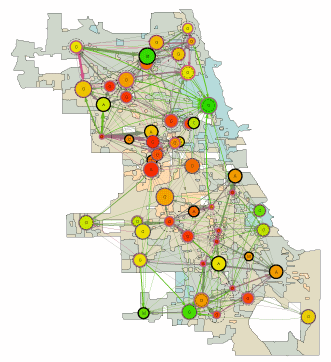Educational Policy Simulation
Exploring the Dynamics of SchoolChoice Through Agent-Based Modeling
Overview

This project investigates the effects of school choice-based educational reforms using an innovative approach -- the iterative construction of computational, agent-based models. By conceptualizing a school district as a complex adaptive system of interdependent agents, we are creating a computational environment that allows for a type of controlled experimentation that has not yet been possible with small pilot choice programs.
Modeling Schools and School Districts as Complex Systems
The emerging field of "complexity," or "complex adaptive systems," studies the dynamics of systems made up of a great number of independent agents interacting in many ways, and often resulting in self-organization. A common characteristic of these systems is that complex population-level behavior frequently comes from simple agents following quite uncomplicated rules.
An oft-cited example used to illustrate the spirit of the complexity perspective is the behavior of a flock of birds. Agent-based simulations of flocking birds consist of only three simple rules for individual bird movement that can loosely be summarized as follows: 1) move towards the birds near you, 2) align yourself with the direction of those birds, but 3) don't get to close to any one bird. Surprisingly, these three simple rules can reproduce many sophisticated group-level flocking patterns.
This example, and many others like it, capture a key insight from the complex systems perspective: without any central coordination, seemingly intelligent and goal-directed system-level behavior can emerge from the simple, local interactions of individual agents. Moreover, we cannot truly understand the behavior of the system (or what some might even call its "collective intelligence") without considering both the group and individual levels of a system at once - i.e., no matter how deeply we investigate the anatomy of anindividual bird we cannot see the flock, but similarly there is nothing in the resulting patterns of group-level flight that do not come from the actions of individual birds.
A basic premise of this project is that just like the difficulties of using a single-level lens to understand the behavior of other complex adaptive systems, the behavior of schools and school districts cannot be fully understood without adopting a dynamic, multi-level perspective.
Choice-Based Reforms
Much controversy surrounds choice-based reforms in education. On one hand, proponents of choice-based reforms claim that giving parents the ability tochoose the school their children attend provides both access to better schooling for disadvantaged populations as well as the incentives necessary forschool reform. On the other hand, opponents of school choice claim that choice-based programs will not bring about the hoped for improvements in schools, but instead only drain resources from troubled schools that can least afford to lose them
While both proponents and opponents to school choice either explicitly or implicitly make assumptions about the mechanisms that tie household- and school-level choices to aggregate performance, little work has explored these mechanisms themselves. In this project we apply the complex systems perspective, and the agent-based modeling approach in particular, to school choice reform to gain a greater understanding of how state- or district-level performance relates to individual- and school-level behavior, and to identify potential leverage points for action within such reforms. Of particular initial interest is the exploration of the natural selection and competition mechanisms assumed to be at work in most of the arguments of both school choice proponents and opponents.
Researchers
Principal Investigators - Louis Gomez, Uri Wilensky
Graduate Student Researchers - Spiro Maroulis, Eytan Bakshy
Presentations / Publications
Leave No Turtle Behind: An Agent-Based Simulation of School Choice Dynamics. The annual meeting of the American Educational Research Association, Montreal, Canada, April 11 - 15, 2005.
Modeling School Districts as Complex Adaptive Systems: A Simulation of Market-Based Reform. The 3rd Lake Arrowhead Conference on Human Complex Systems. Lake Arrowhead, California, May 18 - 22, 2005.
Acknowledgements
The Educational Policy Simulation project gratefully acknowledges the support of The Searle Foundation.
